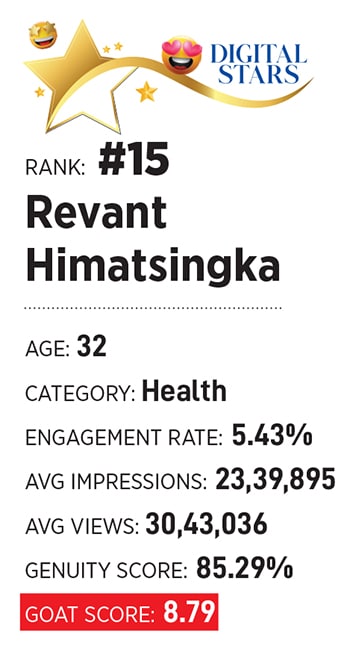Revant Himatsingka: In a battle against junk food and false marketing
Revant Himatsingka ditched his corporate life in the US to make India watch what it eats
 Revant Himatsingka of Foodpharmer ditched his corporate life in the US to make India watch what it eats
Image: Mexy Xavier
Revant Himatsingka of Foodpharmer ditched his corporate life in the US to make India watch what it eats
Image: Mexy Xavier
Last year, when Revant Himatsingka returned to India after spending a few years in the US, obsessed with the idea of making Indians aware of the perils of junk food, he had no clue what lay ahead of him. He had once published a self-help book that touched upon finance, health, religion, death and entrepreneurship, with one chapter on reading labels of packaged goods.
Back in India, after putting in his papers at consultancy firm McKinsey, Himatsingka spent a few months trying to figure out a go-to strategy before finally narrowing down on using videos as a medium to raise awareness. Finally, on April 1, the Kolkata-based Himatsingka put out a video on Bournvita, the chocolate-based children’s health drink, highlighting the amount of sugar in it. Himatsingka even went on to say the drink was preparing children for a life with diabetes instead of victory—a take on the brand’s tagline Tayyari Jeet Ki (preparing for victory).
The video went viral. Mondelēz, the makers of Bournvita, sent Himatsingka a lawsuit and asked him to withdraw the video. Himatsingka obliged, but, by then, the video was viral on WhatsApp and other social media platforms. The government soon swung into action, asking Bournvita to withdraw all misleading advertisements and in April, and asked ecommerce platforms to stop listing Bournvita as a health drink on its platforms.
 For Himatsingka, though, life turned upside down with the video. He became something of a celebrity overnight and soon followed up with more videos on his page, Foodpharmer, to raise awareness on packaged content. Among his videos were those on Maggi, mango juices, airline food and ketchup, questioning their ingredients. Celebrities began sharing his videos, even though the lawsuits didn’t stop.
For Himatsingka, though, life turned upside down with the video. He became something of a celebrity overnight and soon followed up with more videos on his page, Foodpharmer, to raise awareness on packaged content. Among his videos were those on Maggi, mango juices, airline food and ketchup, questioning their ingredients. Celebrities began sharing his videos, even though the lawsuits didn’t stop.
Since then, Himatsingka has moved base to Mumbai, has one employee working with him full time and still relies on lawyers who come forward pro bono to fight out his lawsuits. The move from Kolkata to Mumbai was primarily because Himatsingka had started getting invitations to speak at various forums, and making trips frequently was becoming tedious. Plus, he says, it made sense to work out of Mumbai, India’s financial capital.


















